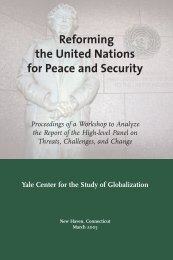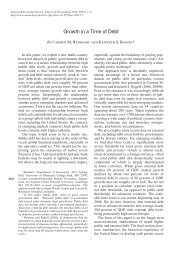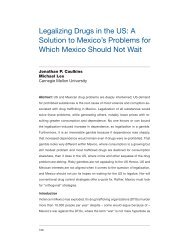The collapse of global trade, murky protectionism, and the crisis:
The collapse of global trade, murky protectionism, and the crisis:
The collapse of global trade, murky protectionism, and the crisis:
Create successful ePaper yourself
Turn your PDF publications into a flip-book with our unique Google optimized e-Paper software.
VOX<br />
Research-based policy analysis <strong>and</strong> commentary from leading economists<br />
precise quantum <strong>of</strong> commitment remains unsettled. Many leading developing countries<br />
have taken a very tough line on <strong>the</strong> acceptable level <strong>of</strong> emissions caps, if any,<br />
arguing that <strong>the</strong>y would constitute an unacceptable restriction on <strong>the</strong> development<br />
<strong>of</strong> <strong>the</strong>ir economies, effectively confining millions to permanent poverty if non-carbon<br />
sources <strong>of</strong> growth cannot be found. Fur<strong>the</strong>rmore, <strong>the</strong> point has been made that<br />
<strong>the</strong> current stock <strong>of</strong> climate change-inducing gases in <strong>the</strong> Earth's atmosphere were<br />
produced almost entirely by rich, industrialised countries for which <strong>the</strong>y alone, so <strong>the</strong><br />
argument goes, bear responsibility. Despite <strong>the</strong>se difficulties, however, much commentary<br />
just after <strong>the</strong> American presidential election <strong>of</strong> 2008 took <strong>the</strong> view that a<br />
negotiating breakthrough could be reached this year.<br />
Less than <strong>global</strong> solutions <strong>and</strong> carbon border taxes<br />
Not every Western policymaker, however, has been prepared to wait for <strong>the</strong> conclusion<br />
<strong>of</strong> <strong>the</strong> climate change negotiations before taking or proposing measures.<br />
Regional (e.g. EU-wide) <strong>and</strong> unilateral moves by industrialised countries have been<br />
mooted <strong>and</strong> <strong>the</strong>ir consequences have caused consternation in governmental <strong>and</strong><br />
business circles in developing countries <strong>and</strong> indeed, if <strong>the</strong> truth be known, in some<br />
Western countries too. As explained in <strong>the</strong> next paragraph, <strong>the</strong> fear is that measures<br />
falling short <strong>of</strong> <strong>global</strong> reach will generate substantial pressures to restrict imports from<br />
countries whose governments are less aggressively taxing carbon use.<br />
Even though a consumption tax applied to <strong>the</strong> carbon content <strong>of</strong> goods <strong>and</strong> services<br />
is probably ideal, difficulties in calculating content arise, especially as many<br />
goods are produced in supply chains involving many different stages <strong>of</strong> manufacture<br />
<strong>and</strong> assembly. As a result, directly taxing producers' use <strong>of</strong> carbon is seen as <strong>the</strong> more<br />
practical option. However, such taxes effectively increase <strong>the</strong> price <strong>of</strong> carbon – <strong>and</strong><br />
with it <strong>the</strong> prices <strong>of</strong> many energy sources. This, in turn, will increase <strong>the</strong> costs <strong>of</strong> production<br />
<strong>of</strong> goods <strong>and</strong> services <strong>and</strong> worsen <strong>the</strong> competitiveness <strong>of</strong> domestic firms visà-vis<br />
certain rivals located abroad.<br />
To <strong>of</strong>fset this adverse effect on competitiveness some proponents, including <strong>the</strong><br />
high-pr<strong>of</strong>ile Lieberman-Warner bill that recently failed in <strong>the</strong> US Congress, have<br />
argued for <strong>the</strong> introduction <strong>of</strong> taxes on imports from those jurisdictions with lower<br />
carbon taxes. Ultimately, it is feared that unilateral <strong>and</strong> regional measures will induce<br />
defensive protectionist pressures that will manifest <strong>the</strong>mselves in measures to limit<br />
imports to <strong>the</strong> detriment <strong>of</strong> trading partners in particular from those poorer countries,<br />
that to date have expressed less interest in reducing carbon usage. <strong>The</strong>se concerns<br />
are exacerbated once account is taken <strong>of</strong> <strong>the</strong> potential for protectionist abuses<br />
<strong>of</strong> <strong>the</strong> discretion given to <strong>of</strong>ficials responsible for implementing future carbon taxes<br />
<strong>and</strong> associated border tax adjustments. Developing countries don't want to see low<br />
tariffs replaced over time by new border barriers that keep <strong>the</strong>ir products out <strong>of</strong> industrialised<br />
countries' markets.<br />
<strong>The</strong> <strong>crisis</strong> <strong>and</strong> green <strong>protectionism</strong><br />
Before turning to <strong>the</strong> impact <strong>of</strong> <strong>the</strong> <strong>global</strong> economic downturn on green <strong>protectionism</strong><br />
<strong>and</strong> climate change initiatives, it is worth noting that <strong>the</strong> various inter-linkages<br />
between international <strong>trade</strong>, commercial policy, environmental policy, <strong>and</strong> environmental<br />
outcomes have long been a concern <strong>of</strong> policymakers <strong>and</strong> <strong>trade</strong> diplomats.<br />
94





